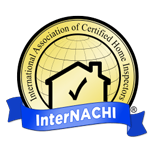Follow Us x
Inspection Q&A
What is a home inspection?
A home inspection is an in-depth analysis of the home's primary structure, foundation, and systematic components. At Ladd Home Inspections LLC, we ensure strict compliance to the InterNACHI standards of practice that sets guidelines for what a home inspector should and should not reference while doing an inspection on your property. At the conclusion of your home inspection, we will prepare a written report summarizing our inspector's findings, recommendations, and photo references.
Why should I get a home inspection?
Don't take buying a new home lightly - this is quite possibly the biggest investment of finances and time you will make. It is imperative to ensure you're proactively protecting yourself from costly repairs and expenses that could've been detected before purchasing your home. Some of these defects may not be so obvious to a homebuyer so be sure to trust a professional home inspector who is competent in uncovering a wide range of issues which can come in the form of simple repairs or severe damage that could even endanger you or your family. Furthermore, most mortgage companies make getting a home inspection mandatory prior to approving a home loan.
At what point in the real estate transaction should I schedule a home inspection?
Typically, a home inspection should be initiated after an offer on the home has been made and accepted, just as long as it is before the closing date. This ensures enough time for any major defects can be resolved before the home changes ownership.
Should I be present for the inspection?
It is advised that you attend the home inspection. Attending will allow you to see for yourself what the inspector finds and help educate yourself about potential future issues. You will get to see a more in-depth view your home's condition and gain a better insight about the weak points (and strong points) of your home which may help facilitate negotiations during the transaction.
What happens if the inspection reveals problems?
In the event that the home inspection reveals issues, it's first important to fully comprehend the severity of the problem at hand. For example, a defective door knob or broken tile is generally a low cost, easy fix. On the other end of the spectrum, any defects in the foundation, a rodent infestation, or major systematic could prove to be more time consuming and costly. In the event of a larger defect, these can sometimes be negotiated in the price of the home with the seller.
When are you available to inspect my home?
We are available to inspect your home as soon as you have made an offer on your home and it has been accepted. Please give us a call at (772) 834-3956 to schedule your home inspection as soon as possible. We pride ourselves on our scheduling flexibility, helping to ensure an on-time closing!
How much is a home inspection?
The price of a home inspection can vary from inspector to inspector. At Ladd Home Inspections LLC, we use standard pricing of $275 per inspection. However, there can be some price variance due to the size and ago of your home. Give us a call at (772) 834-3956 to get a personalized estimate.
What Is "Wind Mitigation" and Why Do I Need It?
Wind mitigation is defined as the process of adding features to your home that increase its ability to withstand high winds resulting from a strong storm or hurricane. Adding the features to your home can land you some pretty considerable credits from your insurance company. We advise that all Florida homeowners highly consider investing in wind mitigation features, especially those homeowners who are located in the hardest hit storm areas. Once the features are added, typically a wind mitigation inspection is required to verify which credits will be applied to the home. During the inspection, the inspector examines and verifies the additions and features added to the home in attempt to reduce wind damage.
In recent years, insurance companies have cracked down on their willingness to issue policies to cover older homes (usually homes that are 25 years or older). The commonality in their reluctancy is that there is a higher probability that the home pay have conditions that could serve as a liability in the future. During a "Four Point Inspection," the inspector focuses on the four main areas in the home, which includes;
- HVAC (Heating, Ventilation, and Air Conditioning)
- Electrical Systems (wiring and panels)
- Plumbing (connections and fixtures)
- Roof


